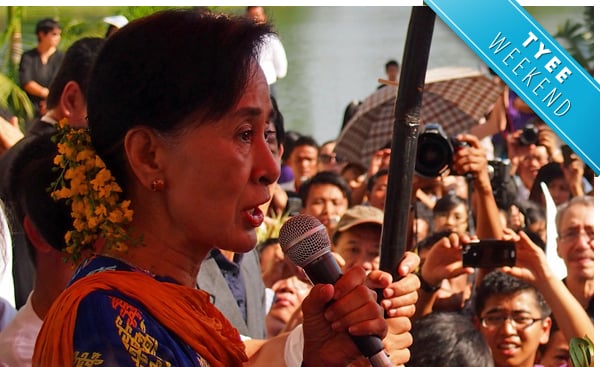The line of people waiting to see the woman Burmese people call Daw Suu snakes out of the ballroom at Yangon's Inya Lake Hotel, around the shaded walkway, down the stairs into the 2 p.m. sun, and curls all the way around the terrace and back to the ballroom, where I stand holding my ticket. It wasn't an easy one to get. Scanning the patient crowd, at least twice as large as any feasible ballroom could hold, it's beginning to dawn on me that my hard-won ticket is useless.
The event is the first Irrawaddy Literary Festival, one more small signifier of new realities in what is likely the world's fastest-changing country. Just two years removed from international pariah status, Myanmar's journey of political and economic reform, while still nascent and potentially fragile, has been astounding. Much credit for this must go to the government of President Thein Sein. But in the hearts of the Burmese people there is only one leader for their country. She is everywhere, on every street -- on t-shirts, handbags, calendars, posters, fans, even in devotional street corner shrines. And today Aung San Suu Kyi is coming here to talk about books.
The daughter of political martyr General Aung San, whose picture often appears beside hers in public, herself the victim of prison and decades of house arrest as a result of her steadfast battle for democracy, Aung San Suu Kyi long ago passed into a realm beyond the political. "She is in my heart," one young Burmese woman tells me. "She is like my mother," says another.
"She has won three Oscars," said a migrant at a Burmese food stall in Bangkok. He then corrected himself: "Nobels. Three Nobels. No one has ever done this before."
No one has ever done this ever, but there was no sense in arguing. The point is, they worship her.
Recently some of her admirers have sounded warning notes. To the dismay of many international observers, Aung San Suu Kyi was reluctant to embrace the cause of Myanmar's oppressed Rohingya minority. And she has recently accepted support from former cronies of the brutal military regime, claiming that their backing simply shows they have seen the light. The passage from national idol to everyday politician is truly a needle's eye.
Yet there is arguably no more compelling figure on the global stage today. Having the chance to see and hear her during my brief Yangon visit seemed too good to be true. And it was in fact turning out that way. "I'm sorry," they told me at the reception. "Tickets are sold out today."
There was a sign-up sheet marked "Press." This presented a conundrum. On general advice I had lied about my profession on my visa application. Journalists, I had heard, did not get visas. But in today's Myanmar realities are changing as fast as the hotel prices that have doubled and more over the past six months. Besides, the secret police were not likely to cross-check a list at a folding table in a hotel lobby. I identified myself as media, and after some wheedling, got my precious ducat.
What reading teaches
Now as I see the line I realize the ticket is simply general admission to the festival. And everyone holding such a ticket wants into this ballroom. Inevitably the announcement comes: the ballroom was full even as this line began to form. But speakers will be set up -- "on the Sunset Terrace" -- so we can hear Aung San Suu Kyi speak. Alas, the Sunset Terrace is many hours from living up to its name. Locals shelter under parasols while others gather in the shade of one large tree.
And then she is speaking. The subject is literature -- political questions have been gently discouraged -- but considering the circumstances of her life political realities are impossible to separate. "I collected books," she says. "You don't throw anything away in prison. Reading gave me an understanding of prison, and of the world. When I finally had the chance to visit other countries, to travel to Britain and so on, there was no culture shock. Through reading I had been able to learn about other societies."
Including, it seems, some hard-to-reach places. "When people tell me I have courage," she says, "I tell them, 'You're not familiar with the world of Harry Potter.' I could never have the courage to do what those children did."
Her other favourite genre: detective stories. "Now that I am on the Rule of Law Committee," she said, "I know more about the law because of my detective stories. It's easier to tell who the villain is. It is always important to ask: who is benefiting from this crime?"
She claimed to keep a Georges Simenon book by her bedside always -- "Partly to keep up my French, and partly because I am so fond of Inspector Maigret. He loves food and he loves his wife. It seems to me he has his priorities straight."
"When we read," Aung San Suu Kyi tells the audience, "we learn to appreciate differences. The Internet leads to polarization. People naturally seek out those with the same ideas. You find others who are ready to back you up. But when we read we discover different countries, different values -- and we learn that none are truly superior to the others."
Her favourite literary figure? Victor Hugo's Jean Valjean: "The ultimate revolutionary," she says.
"Literature is not just fun," she tells the crowd. "I have been influenced by fictional characters. Even a bad book teaches us something -- we learn to understand why it is bad."
As she ages, Aung San says, she has found herself more drawn to poetry. "One line of verse can give me more to think about than a whole book. And you may find that memorizing verse is a very useful skill if you ever find yourself in prison. I certainly hope you will not."
Ode to Myanmar
The inside session is wrapping up. Now there is excitement on the Sunset Terrace. The people here know Aung San Suu Kyi will not forget them, and they are right. Suddenly she is there at a podium, greeting the overflow crowd that can only be described as adoring. "This festival," she tells them, "is about celebrating differences. We have so many different peoples in our country. I think that is the lesson that is important for us now."
She stands just feet away from me now. It is hard to see clearly when blinded by the power of celebrity. Yet her grace and self-possession seem other-worldly. Outwardly at least, her struggles have transformed her into a figure of more gravitas than any world leader save perhaps Nelson Mandela. Whether Aung San Suu Kyi can manage Mandela's incredible feat of overseeing a near-unimaginable political transition while remaining a unifying figure is impossible to know. But she has that opportunity. In that regard, there may be no one else like her.
Someone asks the woman often called The Lady whether the current situation in Myanmar should be told as a detective story or a poem. "Oh, a poem," she says emphatically. "I hope that Myanmar will be the kind of country worth writing poems about." ![]()
Read more: Rights + Justice

















Tyee Commenting Guidelines
Comments that violate guidelines risk being deleted, and violations may result in a temporary or permanent user ban. Maintain the spirit of good conversation to stay in the discussion.
*Please note The Tyee is not a forum for spreading misinformation about COVID-19, denying its existence or minimizing its risk to public health.
Do:
Do not: